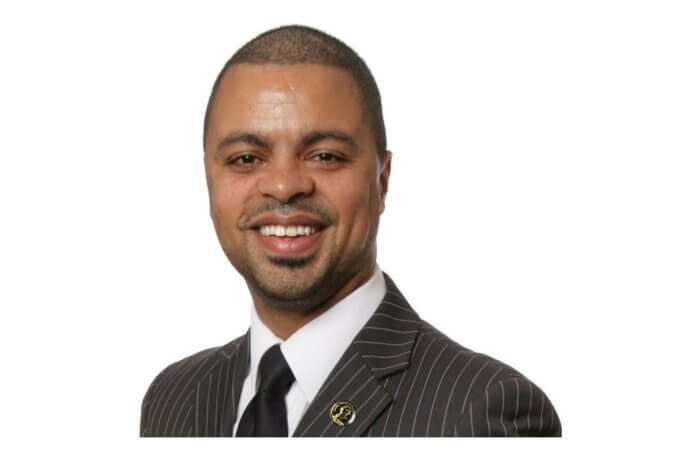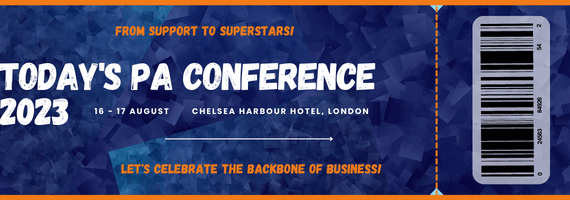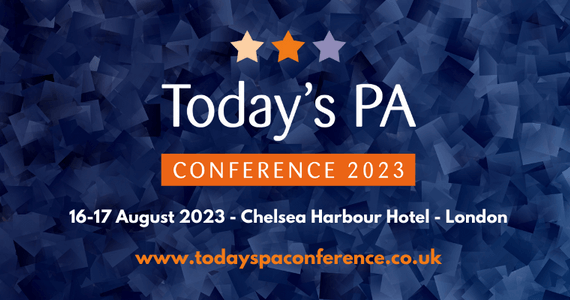Shopping cart
Your cart is empty
£0.00

Rob Neil wants you to bring your ‘A’ game to work. He wants to help you realise that – even as an individual – you have a voice that can make a difference in your organisation. And the more you bring to your role, the better for your clients (internal as well as external), and your own job satisfaction. It’s a win/win situation.
Employee engagement – at all levels of an organisation – is something Rob is passionate about. Throughout his career at the Ministry of Justice (MoJ) he has been at the forefront of projects and initiatives designed to ensure all employees can not only make their voice heard but also have the opportunity to grow, thrive, and reach their full potential.
Speaking to Rob about his talk at upcoming Today’s PA Conference, we first of all asked him about his background and career, before discussing how PAs can be the facilitators of good employee engagement.
“I’ve just started in my new role with the Department for Education [DfE] – I’m a few months into it now so I’m still on a learning curve. But I started my career with the MoJ. I was interviewed one day – and started work the next!
So much has changed in the 35 years since then. But a major change in recent years has been the way the Civil Service has embraced technology. We’re really up to speed with it, and have become slicker and much more efficient and effective in how we use our IT. There is a Civil Service-wide initiative called Smarter Working with hubs all across the UK. We all have mobile devices now, i.e. laptops, smartphones and tablets, so that we can work remotely if we need to. As part of that modernisation we’ve had to get a lot sharper on data security so we have a host of robust procedures to ensure our data is as secure as possible.
At the DfE , all staff are using what I believe is the fastest-growing Microsoft product called MS Teams. It is on a par with Outlook, enabling us to share files, instant messages, documents, screen shots, and conduct ‘live’ chat. It’s a fantastic collaboration tool and one I hadn’t come across before joining the DfE so getting my head around that was definitely a priority!”
“One of my proudest achievements is setting up the BAME [Black Asian and Minority Ethnic] staff network across the entire organisation. When we launched in May 2001 it was one of the early black staff networks in the Civil Service, following Probation [ABPO], Cabinet Office [COBAN] and our Prison Service [RESPECT]. It’s still going strong nearly 20 years later, I’m proud to say – pun intended as we are now called P.R.O.U.D, which stands for People from diverse Racial Origins Uniting the Department.
In our first four years, PROUD grew rapidly in terms of impact, in terms of members, and in terms of support. We were (and still are) passionate about encouraging, supporting and inspiring individuals to bring their very best to the workplace. To move on and up as each member engages fully with the organisation to maximise their potential. That stands out as my proudest achievement – leading the creation of that network, handing it on to my successor, and seeing it go from strength to strength. It offers a safe space for people to hone their skills, earth their emotions, and deal with any challenges the workplace throws up. So, whether it’s forms of racism – which sadly still happens – or more subtle bias, or bullying, or any other challenges which prevent us from offering our very best, the network helps each of us to tackle these issues head on with a strong clear voice and a range of creative solutions. I am immensely proud of the network and its success.
And whilst I might have been the one leading the initiative, I couldn’t have done any of it on my own. Over the years I’ve worked with many incredibly talented people at all levels who have helped and encouraged me. Occasionally by chance, as well as through forethought and applying lessons learnt, I’ve pioneered new ways of working around the issues of diversity and inclusion, continuing to learn so much along the way. But I’ve been lucky enough to work with a whole host of fantastic people and made lifelong friends into the bargain.”
“The title of my talk is ‘It’s Everybody’s Business’, but originally I was going to call it ‘Involve to Evolve’. And, actually, that’s what’s at the heart of it.
One of the things that I’ve come to understand about working in teams – teams of all sizes, all in the same office or working remotely – is that it really is everybody’s business. In our respective workplaces we all work for the one organisation, so, in a sense, the business belongs to all of us. It’s a bit like the John Lewis model in that we all have shares in it (sometimes literally, sometimes not). We’ve all got ‘skin in the game’! It is everybody’s business to be actively engaged. In the public sector, we need to constantly remind ourselves on a daily basis that we are here to meet the needs of our citizens as external customers AND our fellow colleagues as internal customers. In my experience, we produce our best results when we involve everyone to deliver a brilliant service.
For eight years I worked directly in Employee Engagement. My daily objective was to encourage every person I met to bring all of their potential into the workplace. I would feel saddened and disheartened when someone said that they couldn’t wait until 5pm. Not always because they hated their job but because, for them, that was the time they would come alive as they went to their local Neighbourhood Watch meeting, or helped out at Scouts, or led some after-school activity at their local school. In short, they were exercising their passion and as great as that was, I wondered why some of that energy, some of that passion, wasn’t being channelled back into the organisation we work for. Because we can do both – we can work hard and play hard. As long as we look after ourselves, we can engage across all of our lives in a balanced and blended way. With a good night’s sleep, a good diet, and keeping good company, we can do that; we can work hard and bring all of that positive energy and beautiful passion into the workplace, too.
However, there may be factors preventing us from doing this which are entirely out of our control. So ‘it’s everybody’s business’ also means that we – as leaders – and as human beings, need to become more aware of these challenges, more empathic, and do what we can to clear the runway, allowing everyone to be the best they can in the workplace.”
“Unfortunately, in larger organisations, when hierarchy kicks in, some roles tend to be overlooked, and can become neglected and marginalised. Sadly, the PA role can often fall into that category. People don’t immediately appreciate just how critical the role of the PA is to an organisation.
The PAs I’ve worked with have been worth their weight in gold. They are the critical connectors between people who need to be in the same conversation, who need to be involved and engaged. PAs make critical moments happen. I sometimes liken the PAs role to that of a referee on a football pitch. When they’re at their best, you don’t even know they’re there! Like a good referee, an efficient PA keeps things flowing and that’s what all of us really want. I’ve have worked with some fantastic PAs. One of my previous PAs is now a lifelong friend, and when we worked together she improved my output a hundredfold. That’s what good PAs do.
But I don’t mind saying that I have learnt this the hard way. Over the years, as a younger civil servant, I fell into trap of overlooking the PAs. Despite this, I have never de-graded PAs and I have never really liked the fact that certain people look down on others simply because of their grade. Personally, I would get rid of grades tomorrow! I am really only interested in what talents you bring to the party.”
“Attitude counts for much of it. That negative “this will never work” mindset is a challenge.
Lack of clarity is an issue. That’s lack of clarity about where the organisation has been, and where it is now. If no course has been plotted, employees have no understanding of what they are trying to achieve. It’s different to having a confusing or complex story. That’s also detrimental, but what I’m referring to is the absence of a clear strategic narrative, which leaves employees with nothing to engage with.
Another stumbling block is the leaders themselves. Are they apathetic or aggressive, or simply unable to engage with their colleagues? All leaders need to work on and improve their ability to engage with others. Without engaging leaders engagement becomes an increasingly uphill challenge.
Integrity also plays a major part. We have to say what we are going to do – and then do what we say. When the integrity gap is at an absolute minimum, then we engage hearts and minds.
But when an organisation fails to listen to their employees, that’s a significant problem and a major stumbling block. Employee voice is a critical factor and key enabler of engagement. Like Pandora’s Box, once opened, it’s out there for everyone to hear. And it’s not just about listening and hearing those voices; it’s also vital that we act on what we hear.”
“They can work at being leaders themselves, by showing they have a voice, and by developing a level of humility and creativity in how they do this. They can discard the stereotypical or traditional ways of setting up a Board or Committee. They can introduce a more inclusive approach by suggesting a wider mix of people, using knowledge gained from across their own network, and thus bringing a broader range of talents to the decision-making table.”
“I don’t, and it is a difficult adjustment. I’m working in a brand-new central function team and I have to manage my own diary and email now! Yep, my working life just got tougher 🙂
Over the last few years at the MoJ, I’ve had several PAs who were outstanding. They greatly enhanced and improved my effectiveness. Many of them have gone on to greater success. One PA had originally applied to our Fast Stream Diplomatic Scheme but failed very narrowly to get through. She then applied to our Summer Diversity Internship Programme and worked with us for 12 weeks. She proved herself a quick learner and we offered her a one-year fixed term post. At the end of that year, she was successful in applying for a higher-level fast stream in the Diplomatic Service – and used her experience of working with us as her case study.
I always find it amazing to see how often PAs follow managers around. When a manager is promoted or even moves to a different company, quite often the PA will follow. I liken the boss/PA relationship to that of football managers with their backroom staff. Backroom staff tend to follow their managers from team to team, because there is a familiarity there. The boss/PA working relationship is a strong one. As a manager one works closely with one’s PA, and a level of trust and understanding develops which forms the basis of an effective working relationship.”
__________________________________________________________
Rob will be one of our guest speakers at the Today’s PA Conference on Friday 16th August 2019 at the Chelsea Harbour Hotel, London SW10. He will be one of our Expert PA PAnel, discussing the question “What Do Leaders Look for in their PAs?”



Tel.: +44 (0)20 7622 2400
Email: info@todayspa.co.uk
Today's PA
52 The Warwick Building
Chelsea Bridge Wharf
366 Queenstown Road
London
SW11 8NJ
Copyright © 2024 Today's PA. All rights Reserved.
We use cookies, just to track visits to our website, we store no personal details.
ACCEPT COOKIES What are cookies?